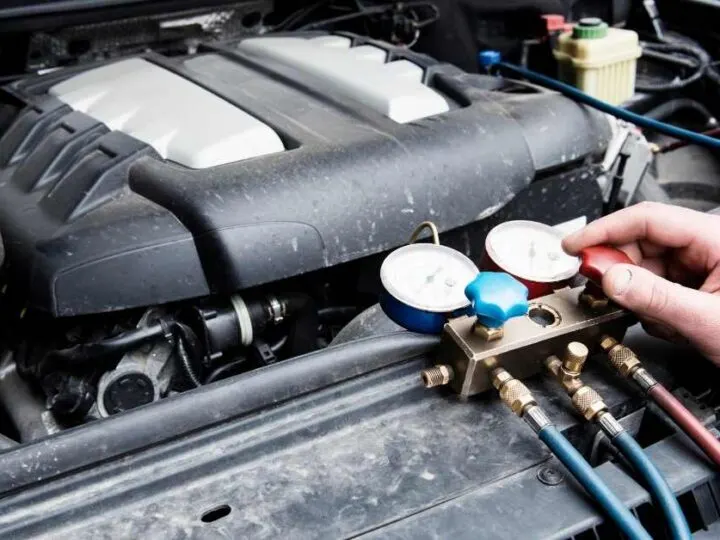Freon is a refrigerant containing many organic compounds like Chlorine, Bromine, carbon, and hydrogen. It plays an important role in the cooling system of any vehicle.
Do Cars Lose Freon Over Time? Cars can lose Freon over time due to leakage in the air conditioning system and different accidental damages. These damages can cause the breakage of under-car components and AC systems. In addition, many vehicles can lose the refrigerant due to the bubbles formation in it and excessive usage of AC. However, it can last longer, like 10 to 12 years, without any refill in the latest models.
Sometimes, a hot wind blows out in your vehicle’s cabin instead of cool air, which means that the AC of the automobile is not working correctly.
What is the function of a Freon?
It is a non-flammable, colorless, odorless, and stable gas that is used in the air conditioning system of the automobile.
It is a kind of refrigerant that draws in from the engine and keeps circulating in the compressor.
After that, the compressor pumps it towards the condenser, where it is compressed into a liquid and expands while circulating through the air conditioning system.
It cools down immediately while passing through the evaporator coil. This cool air then blows out into the car cabin to cool down the vehicle’s interior.
Why do cars lose Freon over time?
It is rare for a vehicle to lose its refrigerant as it recirculates in the closed air conditioning system that prevents it from escaping out.
Hot weather
It is normal for you to use this AC regularly on your drives as compared to people living in cooler places.
Its excessive usage can lead to losing Freon as it consumes more refrigerant than usual.
Presence of moisture in the system
The moisture comes into the system if the different compartments like hoses and seals break down due to the extra pressure of the precision system.
These can also break down when the moisture enters the system and mixes with the gas.
This toxic mixture forms an acid that damages all the compartments of the system leading it towards their breakage.
Accidental damages
Car accidents happen due to various reasons. Therefore, it is better to go to any workshop for its inspection on a regular basis, especially after an accident.
In addition, it leads to severe damage to the air conditioning system, which can cause it to escape.
It is better to check your vehicle’s air conditioning system regularly as no engine light indicates to you about its malfunctioning.
Natural Leaking of Freon overtime
Different compartments of your vehicle can be damaged over time due to excessive mileage or breakage of many parts of the engine.
These parts include different sizes of hoses and seals that cause minor to severe damage to the air conditioning system, which causes the Freon to leak into it.
Moreover, it can escape naturally over time without any specific reason, which causes the malfunctioning of the system.
How would you know that your car is losing Freon?
In any vehicle, no such indicator tells you about the malfunctioning of the air condition system. Many signs and symptoms can inform you about this issue.
Blwoing of warm air
Blowing out warm air is one of the clear signs that there is something wrong with the system.
Check its fluid levels and refill it if required. Do not turn on the AC till you fix this issue.
Noticeable leakage
You can easily notice its leakage from underneath the vehicle, which is an obvious sign that the automobile is losing the refrigerant.
Its leakage can give a greasy appearance inside the cabin that can occur due to the worn-out rubber in the air conditioning system.
It can also happen when your vehicle is exposed to salt and brine in the winter season.
Bubbling up of liquid
You can easily notice the bubbles appearing in the AC system, as in the latest vehicles, there is a glass that covers it.
These bubbles in the liquid indicate that your car is losing Freon, and you have to refill it into the system.
Failed clutch engagement
Normally, a clicking sound occurs when you turn on the vehicle’s AC. This sound indicates to you that the clutch is not in the proper engagement.
This engagement can be damaged when there is not enough amount of refrigerant in the compressor to pressurize the system.
The clutch fails to engage due to its lesser amount present in the vehicle, and it is time to put the refrigerant in the system.
Freezing compressor
When it is losing refrigerant over time, it casts ice coverage over the compressor.
It can happen because the water takes the place of the losing gas.
Therefore, it turns into ice as it cannot have the ability to decompress like the refrigerant.
So, it can be noticed that there is something wrong with the vehicle’s compressor as it freezes.
How much Freon can a car lose over time?
The refrigerant is not something you have to check or regularly refill like engine oil or gear oil.
In the latest models, it can usually escape up to 10% to 15% after every 10 to 12 years. It varies according to the models and the functioning of the automobile.
There are more chances that the automobile loses the AC gas over time if you live in a hotter climate as the hot weather demands AC on daily drives.
Moreover, excessive usage of AC can lead to escaping the gas from the system.
Can a car lose Freon without a leak?
There are no apparent signs that any automobile loses gas without any leakage.
There can be some sort of leakage for many reasons, like under-car damages or worn-out seals or hoses.
Moreover, damage to different compartments of the system can also cause malfunctioning of it and causes the gas to escape out through broken components.
Is it normal for a car AC to lose Freon over time?
Any automobile cannot run on AC gas usually because it keeps recirculating in the closed AC system, preventing it from releasing.
It can lose its refrigerant due to the occurrence of some wear and tear in the system.
For example, it can happen after an accident or due to road hazards.
It is not a serious issue as you can solve it by refilling the required amount of refrigerant in the system. It starts working correctly once you put the gas into it, and you can enjoy the drive.
How often should you refill Freon in a car?
The AC system of any automobile is closed, and the refrigerant cannot release frequently.
This is because it keeps recirculating in this sealed system over and over.
Sometimes, the AC gas releases out due to some damage to the system, and you have to refill it to control the condition of your AC.
In the latest cars, the refrigerant top-up can last up to 10 to 12 years.
How can you put Freon in the car by yourself?
You can refill the refrigerant in your automobile through specific instructions without asking for any professional help.
You have to access the hoses in its engine. Fix one of the hoses to the refrigerant can and ensure that it is fixed perfectly with the opening of the hose.
After that, open its valve to release air from this sealed system.
Start your vehicle, turn on the air conditioner, and keep the can attached to the hose by opening its valve.
Remove the can from the hose once you feel that the can gets empty. This is the step-by-step process through which you can easily refill your vehicle’s freon.
It takes 20 to 25 minutes to put the AC gas into your car.
Related Articles:

